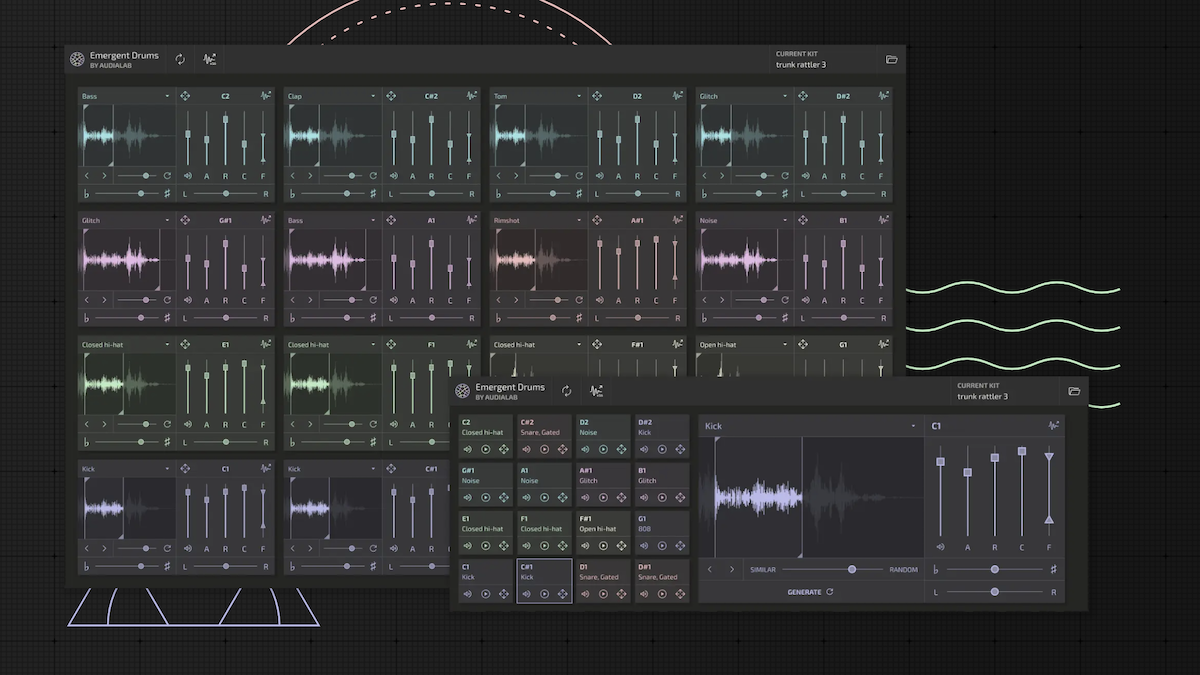MusicRadar Verdict
Though it’s an impressive display of AI’s advancements, MusicLM falls short as a genuinely useful tool for music producers
Pros
- +
Generates royalty-free music samples free of charge
- +
Capable of producing a theoretically infinite amount of different sounds
- +
Often comes out with interestingly experimental results by accident
Cons
- -
Not very good at responding to specific instructions
- -
Audio quality is crunchy and lo-fi
- -
Musical ideas are often garbled
MusicRadar's got your back
The past year has seen astronomical developments taking place in the field of artificial intelligence, as ChatGPT has taken the world by storm and generative AI-powered tools like DALL-E and Midjourney have captured the public’s imagination with their phenomenal ability to instantly produce high-quality images.
While image-generating tools like these have been dominating both headlines and social media feeds, several companies have been quietly working on similar AI-based tools in the music-making sphere which, though they’ve not yet reached the mind-boggling levels of sophistication as their visual counterparts, have shown remarkable results in their ability to generate music and sound using machine learning.
One of the most capable of these AI-powered tools has recently been unveiled by tech giant Google as part of the company’s extensive research into artificial intelligence. MusicLM is a text-to-music sound generator that operates using an AI model that has been trained on thousands of hours of existing music.
MusicLM is capable of generating sounds, musical ideas and even entire tracks on demand while responding to detailed instructions. According to Google, the AI can understand prompts relating to genre, mood and type of instrument, it can adjust the experience level of the 'musician' it's emulating, and it can create music that's appropriate for a given context, like studying or working out. All you’ve got to do is type in your prompt, hit enter, and you’ll receive two audio clips based on your instructions.
Initially unveiled in January, MusicLM has recently been opened up for the public to use through Google’s AI Test Kitchen platform: after joining a waitlist, anyone can now use one of the world’s most advanced AI-powered musical tools to generate audio from within their own browser without paying a penny.
Wait a minute, you might be thinking… why would I want to do that? As computer music-makers, we want to experience and enjoy the creative process of making our own tracks: simply clicking a button that instantly spits out some finished music seems at first like it might threaten to suck the fun out of that whole process, or worse, render human music-makers irrelevant altogether.
As it stands, MusicLM isn’t as sophisticated as we’d hoped it might be
In actuality, the public version of MusicLM isn’t capable of generating an entire track on demand. Instead, it’ll provide the user with two 20-second clips of audio in response to any instruction. This essentially makes it a supercharged, AI-powered sample generator that can produce an infinite amount of royalty-free samples for music-makers to use in their tracks. As a result, MusicLM won’t be replacing humans just yet, but it does offer a significant amount of potential as a tool to be utilized within a music production workflow.
If you’re after a specific sample or loop to use in a production, you might be compelled to comb through platforms like Splice or Loopmasters to find the closest approximation to what you’re looking for. Soon enough, thanks to AI, rather than hunting down a sample that’s close enough to what you’re after, you should be able to instruct AI technology to generate the exact kind of sample that you’re looking for, and it’ll simply summon the audio clip out of thin air.
That’s the idea, anyway. As it stands, MusicLM isn’t as sophisticated as we’d hoped it might be. We tested a broad range of text prompts to see what we could come up with using the software, and it’s fair to say that the majority of these didn’t hit the mark.
First off, almost all the audio MusicLM generates has the same fuzzy and lo-fi character to it: in fact, everything it comes out with just sounds a bit strange, like it's been beamed in from a parallel universe. It’s likely that this is due to the inherent limitations of the machine learning model the software is based on, and it’s a flaw that will undoubtedly be overcome in future iterations. However, it’s a big problem if you want to use the software to create clean and polished audio samples.
First off, we tried using MusicLM to produce drum loops. We entered the prompt ‘130bpm drum loop’ and the AI gave us two drum loops in return, neither of which were 130bpm. However, the loops were solid and interesting enough to drop into a project and build a track around. When we tried to get a bit more specific, using the prompt ‘130bpm techno drum loop, syncopated hi-hats, crash cymbal on third beat of every bar’, MusicLM yet again failed to hit the brief on tempo and crash cymbals were notably absent, though one of the clips did contain some funky syncopated hats and the overall vibe was more techno-flavoured.
Next up, we tried to generate some vocal samples in the style of Mariah Carey, and ran into a stumbling block: in an attempt to evade copyright issues, MusicLM has been designed in such a way that it’s incapable of generating audio that imitates existing artists. In fact, the software won’t produce vocals at all, and when we tried the prompt ‘female vocals’ we were presented with an ethereal choir of garbled alien voices that sounded nothing like the female vocal hooks we were looking for.
In another test, we asked MusicLM to create a ‘lead synthesizer melody in A major’. Simple enough, right? The software gave us a peppy, if somewhat uninspiring synth melody in return, though neither of the clips were in the requested key, and both contained drums, making them less usable as a loop in a music production scenario. To fix that, we doubled down, entering the prompt ‘lead synthesizer melody in A major, no drums or other instruments’. This seemed to confuse MusicLM even more, as the software spat out a fully-formed piece of synth-funk with both drums and bass attached.
Deciding to run with that theme, we attempted to cajole MusicLM into producing some more fleshed-out samples that could be used as the basis for a beat. We stuck in ''50s jazz with saxophone, melancholic vibes' and while the results certainly didn't sound like '50s jazz (nor was it particularly melancholic) we received a jazzy hip-hop beat in return, complete with a decent enough saxophone melody. Certainly usable, if not entirely accurate.
Not wanting to confine our experiments exclusively to Western music, we asked MusicLM to generate some music from other cultures. The prompt 'Indian classical music with sitar' worked well enough, producing two wonky, garbled clips that sounded like Indian classical music transmitted over a malfunctioning radio: happily, we could hear both a sitar and tabla in the mix.
So far, so unimpressive. When we realized that MusicLM wasn’t going to respond to specific prompts in the way that we’d hoped, we tried a different approach that produced some far more interesting results. Heading over to the online record store Boomkat, we lifted portions of their famously verbose album writeups to give MusicLM something a little more abstract to chew on, snipping out any obvious artist names from the text before using them as prompts.
This scattergun approach produced some fascinating and strange snippets of music, as MusicLM’s confused attempts to approximate our musical word salad ended up unintentionally creating some experimental and unfamiliar sounds and textures. In this way, MusicLM could work as a kind of semi-random sample generator, not always capable of generating custom sounds to match specific briefs, but more of an AI-based equivalent to picking out a few albums at random in the record store to take home and comb for interesting sounds.
Overall, MusicLM doesn’t seem poised to put producers and musicians out of a job just yet, and neither does it seem capable of supplanting sample libraries and sound designers as a sound-generating tool. It is, however, an intriguing and boundary-pushing piece of technology that’s useful for creating unexpected sounds and unconventional samples. Artificial intelligence is rapidly advancing in its sophistication, and if this is what MusicLM can do now, we can only imagine what the tools designed by Google and its competitors will be capable of in the years to come.

I'm MusicRadar's Tech Editor, working across everything from product news and gear-focused features to artist interviews and tech tutorials. I love electronic music and I'm perpetually fascinated by the tools we use to make it. When I'm not behind my laptop keyboard, you'll probably find me behind a MIDI keyboard, carefully crafting the beginnings of another project that I'll ultimately abandon to the creative graveyard that is my overstuffed hard drive.
“A fabulous trip through all eight songs by 24 wonderful artists and remixers... way beyond anything I could have hoped for”: Robert Smith announces new Cure remix album
“He knows what I'm thinking and feeling before I even know it": Billie Eilish suggests that she and brother Finneas can read each other's minds
“A purpose-built solution for bassists seeking unparalleled sound-shaping capabilities”: Darkglass Electronics unveils the Anagram Bass Workstation – a state-of-the-art multi-effects for bass guitar with neural amp model support and a 7” touchscreen













